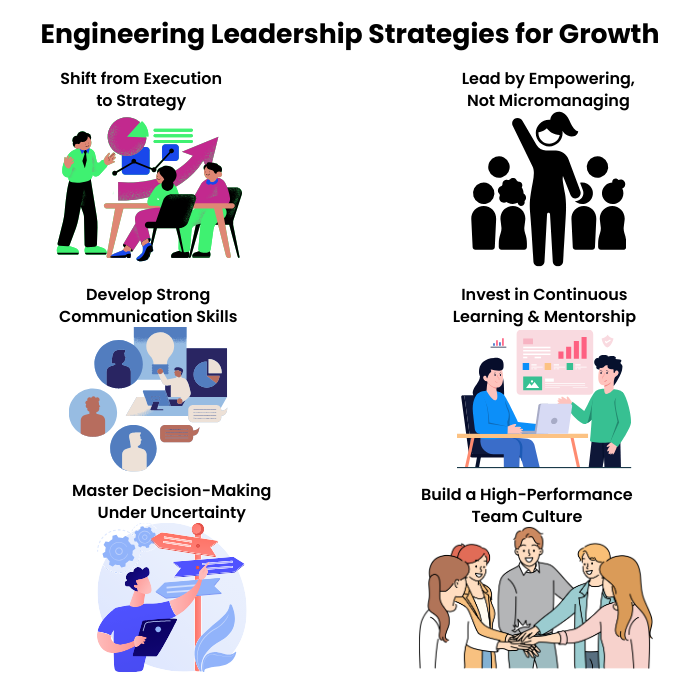Engineering leadership development is about more than just technical expertise—it’s about leading teams, making strategic decisions, and driving projects to success. That’s a different game, right? That’s why, even after being one of the best engineers, some struggle when they step into leadership roles. You don’t have to be the smartest person in the room or have the most technical experience, but you should have the ability to balance technical, strategic, and management skills. The skills that got you here won’t be enough to take you to the next level.
Moving from engineer to leader means shifting from solving problems yourself to guiding others, making tough calls, and ensuring your team thrives. It’s not just about understanding technology—it’s about influencing people, aligning technical efforts with business goals, and driving innovation.
This guide covers everything you need to know—what skills to develop, how to transition from engineer to manager, and the best training programs to help you grow. If you’re ready to build a successful leadership career in engineering, let’s dive in.
Engineering Leadership Development: What It Is and Why It Matters
Engineering leadership development is the process of transitioning from technical expert to effective leader. It involves building management, communication, and decision-making skills that help engineers lead teams, manage projects, and make strategic choices. Unlike technical skills, leadership requires understanding people, aligning work with business goals, and ensuring long-term success.
Engineers often face challenges when moving into leadership because they’re used to being individual contributors rather than people managers. Leadership isn’t just about knowing the best technical solution—it’s about trusting the team, delegating tasks, and setting the right direction. Making technical decisions is one thing, but balancing project timelines, budgets, and team dynamics is a whole new challenge.
This is where leadership training makes a difference. Engineers who invest in mentorship, management training, and real-world leadership experience develop the skills needed to communicate effectively, lead teams, and make high-impact decisions. Whether you’re preparing for leadership or already managing a team, building strong leadership skills is key to long-term career growth.
Must-Have Engineering Leadership Skills for Career Growth

Stepping into an engineering leadership role means mastering a new set of skills beyond technical expertise. The ability to lead people, communicate effectively, and make high-impact decisions separates a strong leader from a great engineer. While technical knowledge is valuable, leadership is about guiding teams, solving problems at a strategic level, and driving long-term success.
Technical Leadership vs. People Leadership
Great engineering leaders understand when to step in and when to step back. While technical leadership involves setting standards, making architectural decisions, and solving complex problems, people leadership is about empowering teams, setting clear expectations, and fostering a culture of trust and accountability.
One of the biggest mistakes new leaders make is micromanagement—trying to control every detail instead of trusting their team. This slows progress and kills motivation. Instead, strong leaders delegate effectively, provide guidance when needed, and create an environment where engineers can thrive without constant oversight.
Communication & Decision-Making Skills for Engineering Leaders
Engineers are used to speaking in technical terms, but leadership requires translating complex ideas into clear, actionable insights for different audiences. Leaders must bridge the gap between engineers, executives, and stakeholders, ensuring everyone understands priorities and trade-offs.
Decision-making also shifts at the leadership level. Instead of just optimizing code or solving technical issues, engineering leaders must weigh business impact, team dynamics, and long-term strategy. Balancing data-driven decision-making with business needs is essential—sometimes, the best technical solution isn’t the right business choice.
Managing and Scaling High-Performing Engineering Teams
A leader’s biggest responsibility isn’t just building great products—it’s building and maintaining a great team. This starts with hiring the right talent, coaching engineers for growth, and creating a culture that keeps them engaged and motivated.
Strong leaders recognize individual strengths, provide career development opportunities, and create an environment where engineers can do their best work. A positive team culture isn’t just about perks—it’s about trust, clear communication, and making every team member feel valued.
Engineer to Manager Transition: Steps to Leadership Success
The shift from engineer to manager means letting go of hands-on work and focusing on leading teams, strategy, and decision-making. Success is no longer about your contributions but how well your team performs.
To make this transition easier, start developing leadership skills before you get promoted. Take on mentoring roles, lead projects, and practice making decisions beyond technical tasks. Many successful managers also invest in engineering leadership training programs to gain structured guidance on management, communication, and strategic thinking.
Steps to Move from Engineer to Engineering Leader
Shift Your Mindset from Individual Contributor to Team Leader
- Stop focusing on doing the work yourself—learn to guide and support your team instead.
- Measure success by team performance, not just your individual output.
Start Leading Before You Get the Title
- Take on mentorship roles, coach junior engineers, and lead small projects.
- Volunteer for cross-functional initiatives that require leadership skills.
Improve People Management Skills
- Learn how to motivate your team, handle conflicts, and give constructive feedback.
- Develop emotional intelligence—understanding how different team members work best.
- Set clear expectations and provide support without micromanaging.
Master Communication & Decision-Making
- Learn how to communicate with executives, stakeholders, and non-technical teams.
- Balance data-driven decision-making with business priorities.
Invest in Engineering Leadership Training & Mentorship
- Take management courses, leadership workshops, or coaching programs.
- Learn from experienced engineering managers through mentorship.
Understand Business and Strategy
- Align technical decisions with company goals and long-term vision.
- Learn budgeting, resource planning, and team scaling strategies.
The sooner you start developing these skills, the smoother your transition will be.
Top Engineering Leadership Training Programs & Online Courses
Engineering leadership training programs help engineers develop management, decision-making, and communication skills needed to succeed in leadership roles. Whether you’re preparing for management or looking to refine your leadership style, the right program can make a big difference.
Top Engineering Leadership Programs for Skill Development
For engineers wanting structured, high-impact training, these programs stand out:
- MIT Sloan: Leadership in Engineering & Technology – A hands-on program blending technical leadership with business strategy.
- Stanford: Engineering Leadership Program (ELP) – Covers decision-making, innovation, and team leadership for technical professionals.
- Harvard Business School: Leadership Principles – Focuses on management fundamentals and strategic thinking for new leaders.
- UC Berkeley: Engineering Leadership Professional Program – Helps engineers develop executive presence and lead technical teams effectively.
These in-depth programs are great for engineers in leadership positions or preparing for executive roles, but if you need a more flexible, online option, there are great self-paced courses as well.
Online Engineering Leadership Courses & Certifications
For those looking to develop leadership skills at their own pace, online courses and certifications offer flexibility without sacrificing quality:
- Coursera: Engineering Leadership (Rice University) – Teaches communication, decision-making, and management fundamentals.
- MIT xPRO: Leadership Principles for Engineers – Focuses on technical leadership and strategic decision-making.
- Udemy: Leadership Skills for Engineers – A beginner-friendly course covering team management and leadership strategies.
- LinkedIn Learning: Engineering Management Foundations – A quick, practical guide for first-time engineering managers.
What Skills and Training Are Essential for Advancing from Senior Engineer to Leadership in Engineering?
To advance from senior engineer to leadership in engineering, professionals must develop both technical expertise and soft skills. Effective communication, team collaboration, and decision-making are crucial. Additionally, pursuing mentorship and networking opportunities can enhance knowledge. Embracing strategies for engineering leadership advancement will prepare aspiring leaders for the challenges ahead.
Engineering Leadership Strategies for Career Advancement
Becoming an effective engineering leader isn’t just about earning a promotion—it’s about consistently improving how you lead teams, make decisions, and drive results. Leadership is a skill that develops over time, and those who actively refine their approach advance faster and create more impact.

Here are key strategies to grow as an engineering leader and accelerate your career:
Shift from Execution to Strategy
- Stop focusing only on technical problem-solving—learn to align engineering efforts with business goals.
- Think about long-term impact, not just immediate solutions.
Develop Strong Communication Skills
- Learn to explain technical concepts to executives and non-technical teams.
- Make your ideas more persuasive by focusing on business value, not just technical details.
Master Decision-Making Under Uncertainty
- Balance data-driven decision-making with business realities—sometimes, the best technical choice isn’t the best business move.
- Get comfortable making calls even when all the data isn’t available.
Lead by Empowering, Not Micromanaging
- Trust your team—set expectations and let them take ownership.
- Focus on removing roadblocks instead of controlling every detail.
Invest in Continuous Learning & Mentorship
- Learn from successful engineering leaders—seek mentorship and reverse mentorship.
- Take leadership courses, attend industry events, and expand your network.
Build a High-Performance Team Culture
- Recognize individual strengths and help your team members grow in their roles.
- Encourage open feedback, problem-solving, and continuous improvement.
The best engineering leaders don’t just manage teams—they inspire them.
Conclusion: The Path to Becoming a Great Engineering Leader
Engineering leadership isn’t about having all the answers—it’s about guiding your team to find the best solutions together. The most successful engineering leaders never stop learning, adapting, and refining their approach.
If you want to grow in your leadership role, don’t wait for a promotion to start leading. Step up now—mentor others, take ownership of projects, and learn to communicate beyond technical details. Leadership isn’t a title; it’s how you show up every day to support, inspire, and drive results.
Invest in your growth. Whether through mentorship, structured training, or real-world experience, every step you take today builds the foundation for long-term success. Start applying what you’ve learned, push yourself outside your comfort zone, and become the leader your team needs.
Your career is in your hands. Where will you take it next?




